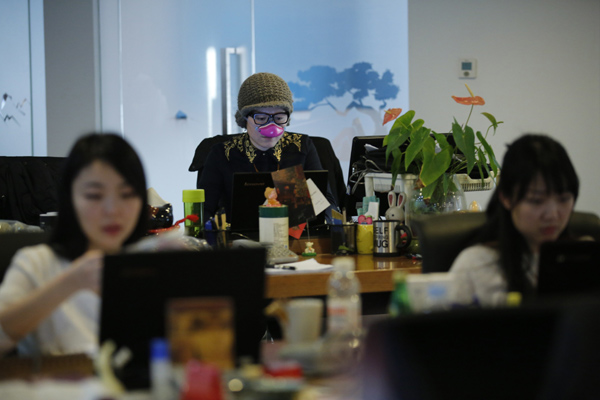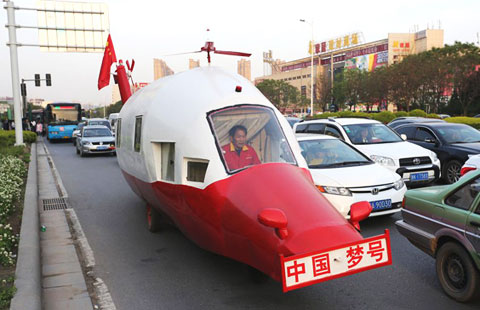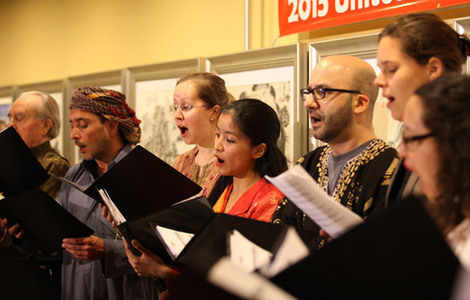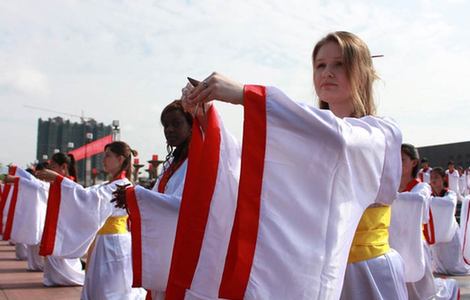Days of severe air pollution rise in region
Updated: 2015-04-23 07:06
By ZHENG JINRAN(China Daily)
|
||||||||
 |
|
Yong Xiaoyan, a pregnant woman, wears a facemask that can filter out tiny particles of pollution as she works at her office in Beijing in December.[KIM KYUNG-HOON/REUTERS] |
The Beijing-Tianjin-Hebei region saw more days of severe air pollution in March than the monthly national average and worsening conditions since February, a report from the national environment watchdog said on Wednesday.
Thirteen cities in the region reached national air quality standards just over a third of the time in March, according to the monthly report on air quality released by the Ministry of Environmental Protection. The report covers 74 major cities. Although the proportion of days with good air quality was 1.7 percent higher than that in March of last year, showing slight improvement, the region still had more serious pollution than in February, it said.
Sixteen cities, including Baoding and Xingtai of Hebei province, experienced high pollution days more than half the time in March, said Luo Yi, head of the Environmental Supervision Bureau of the ministry.
In addition, the Beijing-Tianjin-Hebei region experienced more days of severe air pollution than the other major cities in the first quarter, surpassing the national average by 9.1 percent.
Baoding, which neighbors the capital in the south, has been the most polluted for the first three months. It also was listed in the top 10 last year, based on the ministry's reports. In response, the city has sought to curb air pollution by shutting down polluting companies and removing outdated equipment in polluting industries.
The city government said it was hiring environmental experts to aid in targeting its efforts and making them more effective and efficient.
"I have sensed their great pressure in curbing air pollution," said Chai Fahe, deputy dean of the China Research Academy of Environmental Sciences and also a consultant for Baoding.
Excessive consumption of coal in the downtown area in the heating season has been a major reason for the serious air pollution. "I suggested they focus on the urgent targets, such as the coal consumption from scattered households and the vehicle exhaust emission within the Second Ring Road," Chai said.
Hebei province, which had seven cities listed in the top 10 cities with serious air pollution in March, has been working to rein in pollutants emitted fromt he production of iron, steel and glass in an effort to reach its clean air targets.
The Hebei provincial government also has implemented tough restrictions on the growth of thermal power plants, iron and steel plants, cement plants and other major polluting industries, Xinhua News Agency reported.
The province's action plan also seeks to reduce boilers in the downtown area and reduce coal consumption.
- 80 percent of PM2.5 inhaled indoors in Beijing
- Beijing accelerates air pollution control for Olympics expectation
- Beijing introduces new air pollution response
- Air pollution tops public concerns for "the upcoming two sessions"
- Ministry plans five-year air pollution control project
- China to reduce coal consumption for better air

 Chinese real estate deals in US topical forum
Chinese real estate deals in US topical forum
 Weird stuff you can buy on Taobao
Weird stuff you can buy on Taobao
 Top 5 wealthiest women in world's tech sector
Top 5 wealthiest women in world's tech sector
 Outsiders challenge traditional smartphone makers
Outsiders challenge traditional smartphone makers
 Helicopter replica on the road
Helicopter replica on the road
 Singing Chinese language's praises
Singing Chinese language's praises
 Foreign girls join in ancient Chinese coming-of-age ritual
Foreign girls join in ancient Chinese coming-of-age ritual
 Shanghai auto show kicks off
Shanghai auto show kicks off
Most Viewed
Editor's Picks

|

|

|

|

|

|
Today's Top News
China sustains US cities: Bloomberg
Real estate investors may switch focus: panel
Obama submits nuclear energy cooperation deal with China
US urges Japan to handle wartime history in constructive way
Mexico bans poultry, egg imports from bird flu-hit Iowa
Bloomberg: Chinese investment sustains US cities
China, Pakistan elevate ties, commit to long-lasting friendship
'Belt-Road' to exchange goodwill with economic coopertation
US Weekly

|

|






